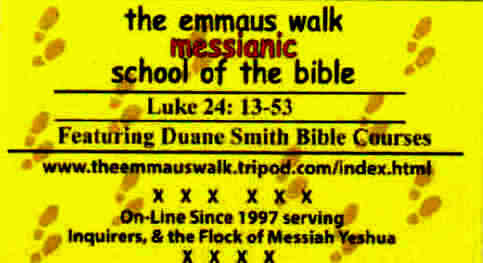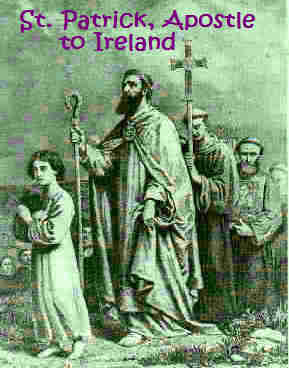
THE EMMAUS WALK PRESENTS:
"Irish Savior, St. Patrick, Was Foreign-Born,"
by Ronald Ginther,"
Reprinted from the Eatonville DISPATCH
Reprinted from the Eatonville DISPATCH


Ireland's most famous son and patron saint, St. Patrick, was not even Irish and the Catholic Church never canonized him as a saint.
His career began in the bottom of a slaver's boat. Bound, bleeding and bruised, he was a frightened 16-year-old who had been taken from his native village on the west coast of Britain to be sold as a slave in Ireland. As a slave, he would spend six years tending flocks of sheep among green but alien hills wondering how he would ever find his way home.
Born of a well-respected family, accustomed to fine clothes and a genteel and civilized way of life, he must have despaired as he thought of his current condition and his lost chance to follow his father as church deacon and a member of the hometown municipal council.
Patrick had good reason to be discouraged. Ireland in the latter part of the 4th century and on into the 5th was primitive and pagan, a haven for superstition and depravity--the citizens were only a shade better off than a wretched slave. For the likes of the foreign-born Patrick, life promised to be nasty, brutish, and short.
HEAVENLY VISIONS
But a light penetrated the boy's dark despair. Patrick began having visions of heavenly things. Though still condemned to herding a band of sheep until he dropped from hunger and disease, he was startled by a clear, heavenly message that came to him one night in a dream. He was told to escape, and that to aid him a boat would be waiting for him on the coast.
He fled the dungeon of Ireland and survived the dangerous journey and located the promised vessel of mercy.
SAFE AT HOME AT LAST!
Returning home, enjoying the comforts again of civilized socity and a Christian family, Patrick probably forgot Ireland like a bad dream and scarcely remembered the unexpected raid on the town that had so rudely interrupted his life. But Patrick, now 22, had yet another dream.
He saw a man approaching his bedside holding a parchment letter from the people of Ireland who were physically and spiritually enslaved. Written in blood and tears, the letter sank indelibly into Patrick's heart and soul. "Holy youth," the man in the dream pleaded, "we beseech thee to come and walk once more among us."
After finishing his education, some say in a monastery school in the islands off the south coast of France, he answered the call with characteristic courage and faith. He returned to Ireland--the place of his bondage and near death--and spent the rest of his life as a bishop tending human "sheep."
For a first assignment in the kingdom of God, Patrick's mission to the Irish was as rough and perilous as another mission field to the south, North Africa, well known as a "missionary's graveyard."
Bloody rites, sun-worship and witchcraft held most of the Emerald Island in an iron grip. Like Moses against Pharaoh's magicians, or Elijah against Jezebel's priests of Baal, Patrick had to take a stand for Jesus Christ against the rival religious system of the powerful Druids. Recognizing the threat to their power, the Druids moved against Patrick, fighting his heavenly fire with their own.
APPOINTED BISHOP
Patrick, as Ireland's appointed bishop, established churches, schools and houses of charity throughout Ireland after vanquishing and driving out the oppressive idolatry of the Druids (and with them, according to popular Irish legends, all the snakes in Ireland).
It is no wonder Ireland still remembers and celebrates March 17 in honor of its non-Irish deliverer over 14 hundred years after his death. The debt the Irish people owe him is perhaps eternal--acknowledged in a common belief that at the Last Judgment he will preside over the fate of his beloved adopted country.
Conveying a St. Patrick's message to America and the world, a former president of Ireland stated, "To all our friends beyond the seas, greetings and good wishes on this St. Patrick's Day. For generations St. Patrick's Day has been set apart for the public acknowledgement of God's goodness to our people in enriching them with the treasure of St. Patrick's faith and in sustaining them through centuries of trial and sorrow."

Note: The "common belief" that St. Patrick will preside over the fate of his beloved adopted people and nation, the Irish, is a rather chilling prospect, one he probably would not want or enjoy! This nation he gave his life to save for Christ has turned increasingly against everything he labored so long to teach them: to obey the commandments of God, to surrender to the God of the Gospel of Jesus Christ, and live as children of God, not the devil. The drinking, carousing, immorality, even the witchcraft, have all returned to afflict and enslave the Irish people with a vengeance. They are perhaps worse than they were when he returned to Ireland with the saving and liberating Gospel of Jesus Christ. Now St. Patrick's Day has become, as everyone is well aware, an excuse for a lot of drinking binges--hardly in honor of St. Patrick, the namesake of the celebration! Rather, they dishonor such a great, holy evangelist and bishop, by putting his name to their unholy and disgraceful revels! It is a terrible shame, and it continues on, year after year. The wearing of the green (and being pinched if you do not!), the little kids dressed up like walking shamrocks, and the big parades in New York and elsewhere, are innocent enough in themselves, but not the drinking and carousing which come before, during and after these parades in many a town and city across Ireland and the world where the Irish congregate to celebrate their "Irishness." But the day is probably celebrated by many times their number of equally carnal, godless non-Irish, who just go along with it for the fun and the alcoholic frolic.
I do admire, however, what the former Irish president said, that for him this Day commemorates the Irish people's public acknowledgement of God's goodness to them, a God who enriched them with the faith of St. Patrick, and this very faith sustained them through centuries of trial and sorrow at the hands of their enemies, mainly the British, but also the great Potato Blight that caused a famine that killed over two million people, forcing a million or more others to flee to foreign lands. Only in the last ten or twenty years has Ireland began to recover some of that lost population and experience prosperity, as well as a "peace dividend" from the final end of the brutal, terrorist-ridden conflict in Northern Ireland between the Catholics and Protestants that took thousands of lives and created havoc for generations. Surely, that is reason to be thankful to God! The Christian faith is Ireland's greatest treasure, not the materialism and the drinking and the mad pleasure-seeking. But to see them give their greatest Treasure up now and adopt hedonism and drunkenness and a society in moral free-fall, that is a very sad thing, for they once knew the glorious Gospel shining brightly all across their lush green Emerald Island, a Gospel brought to them originally by St. Patrick, the former slave boy who herded sheep for a man called Milchu but on whom heaven had set its blessing and anointing. We do hope and pray that is is not too late, and a revival and wave of repentance will sweep through Ireland and capture their hearts and lives anew for Christ who loves them so dearly! That ought to be our prayer for Ireland and its people, and it is our prayer.--Ronald Ginther
What was Patrick all about? It was Christ. He was in danger every day of his life from assassination, and said so, so he depended utterly on Christ for every step of his way--literally. The following anonymous poem is Patrick's whole message to the Irish people and the best expression of his courageous faith, which he expressed in the same clear, humble terms, if you ever get to read his autobiography or at least read excerpts from, "Confessions," written shortly before he died.
CHRIST ALL IN ALL
Christ for sickness, Christ for health,
Christ for poverty, Christ for wealth,
Christ for joy, Christ for sorrow,
Christ today, and Christ tomorrow,
Christ my life, Christ my light,
Christ for morning, noon, and night,
Christ when all around gives way,
Christ my everlasting stay,
Christ my rest and Christ my food,
Christ above my highest good,
Christ my well beloved, my friend,
Christ my pleasure, without end,
Christ my Savior, Christ my Lord,
Christ my portion, Christ my God,
Christ my good shepherd, I His sheep,
Christ Himself my soul doth keep,
Christ my leader, Christ my peace,
Christ hath given my soul release,
Christ my righteousness divine,
Christ for me, for He is mine!
Christ my wisdom, Christ my meat,
Christ restores my wandering feet,
Christ my advocate and priest,
Christ who ne'er forgets the least,
Christ my teacher, Christ my guide,
Christ my rock, in Christ I hide,
Christ the everlasting bread,
Christ His precious blood has shed,
Christ has brought me nigh to God,
Christ the everlasting Word,
Christ my master, Christ my head,
Christ who for my sins hath bled,
Christ my glory, Christ my crown,
Christ the plant of great renown,
Christ my comforter on high,
Christ my hope is ever nigh,
Christ is coming in the air,
Christ--Come quickly is my prayer!

The Emmaus Walk Home Page
Format only: (c) 2010, Butterfly Productions, All Rights Reserved

